p19Arf suppresses growth, progression, and metastasis of Hras-driven carcinomas through p53-dependent and -independent pathways
- PMID: 15314658
- PMCID: PMC509304
- DOI: 10.1371/journal.pbio.0020242
p19Arf suppresses growth, progression, and metastasis of Hras-driven carcinomas through p53-dependent and -independent pathways
Abstract
Ectopic expression of oncogenes such as Ras induces expression of p19(Arf), which, in turn, activates p53 and growth arrest. Here, we used a multistage model of squamous cell carcinoma development to investigate the functional interactions between Ras, p19(Arf), and p53 during tumor progression in the mouse. Skin tumors were induced in wild-type, p19(Arf)-deficient, and p53-deficient mice using the DMBA/TPA two-step protocol. Activating mutations in Hras were detected in all papillomas and carcinomas examined, regardless of genotype. Relative to wild-type mice, the growth rate of papillomas was greater in p19(Arf)-deficient mice, and reduced in p53-deficient mice. Malignant conversion of papillomas to squamous cell carcinomas, as well as metastasis to lymph nodes and lungs, was markedly accelerated in both p19 (Arf)- and p53-deficient mice. Thus, p19(Arf) inhibits the growth rate of tumors in a p53-independent manner. Through its regulation of p53, p19(Arf) also suppresses malignant conversion and metastasis. p53 expression was upregulated in papillomas from wild-type but not p19( Arf)-null mice, and p53 mutations were more frequently seen in wild-type than in p19( Arf)-null carcinomas. This indicates that selection for p53 mutations is a direct result of signaling from the initiating oncogenic lesion, Hras, acting through p19(Arf).
Conflict of interest statement
The authors have declared that no conflicts of interest exist.
Figures
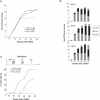
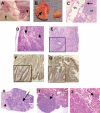

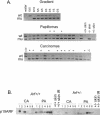
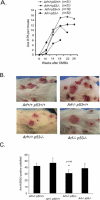
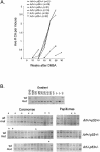

Similar articles
-
p19/Arf and p53 suppress sentinel lymph node lymphangiogenesis and carcinoma metastasis.Oncogene. 2008 May 15;27(22):3145-55. doi: 10.1038/sj.onc.1210973. Epub 2007 Dec 3. Oncogene. 2008. PMID: 18059331
-
Oncogenic ras activates the ARF-p53 pathway to suppress epithelial cell transformation.Proc Natl Acad Sci U S A. 2001 Apr 24;98(9):5025-30. doi: 10.1073/pnas.091100298. Epub 2001 Apr 17. Proc Natl Acad Sci U S A. 2001. PMID: 11309506 Free PMC article.
-
p19(ARF) is dispensable for oncogenic stress-induced p53-mediated apoptosis and tumor suppression in vivo.Mol Cell Biol. 2002 Jan;22(1):370-7. doi: 10.1128/MCB.22.1.370-377.2002. Mol Cell Biol. 2002. PMID: 11739748 Free PMC article.
-
p53-Dependent and -independent functions of the Arf tumor suppressor.Cold Spring Harb Symp Quant Biol. 2005;70:129-37. doi: 10.1101/sqb.2005.70.004. Cold Spring Harb Symp Quant Biol. 2005. PMID: 16869746 Review.
-
Activation of p53 by oncogenes.Endocr Relat Cancer. 1999 Mar;6(1):45-8. doi: 10.1677/erc.0.0060045. Endocr Relat Cancer. 1999. PMID: 10732786 Review.
Cited by
-
Tumor suppression by p53 in the absence of Atm.Mol Cancer Res. 2008 Jul;6(7):1185-92. doi: 10.1158/1541-7786.MCR-07-2009. Epub 2008 Jun 26. Mol Cancer Res. 2008. PMID: 18583527 Free PMC article.
-
p35 is required for CDK5 activation in cellular senescence.J Biol Chem. 2010 May 7;285(19):14671-80. doi: 10.1074/jbc.M109.066118. Epub 2010 Feb 24. J Biol Chem. 2010. PMID: 20181942 Free PMC article.
-
Inactivation of the quinone oxidoreductases NQO1 and NQO2 strongly elevates the incidence and multiplicity of chemically induced skin tumors.Cancer Res. 2010 Feb 1;70(3):1006-14. doi: 10.1158/0008-5472.CAN-09-2938. Epub 2010 Jan 26. Cancer Res. 2010. Retraction in: Cancer Res. 2018 Nov 1;78(21):6345. doi: 10.1158/0008-5472.CAN-18-2453. PMID: 20103645 Free PMC article. Retracted.
-
Transcriptional repression: the dark side of myc.Genes Cancer. 2010 Jun;1(6):580-6. doi: 10.1177/1947601910379012. Genes Cancer. 2010. PMID: 21779459 Free PMC article.
-
Large-scale mutagenesis in p19(ARF)- and p53-deficient mice identifies cancer genes and their collaborative networks.Cell. 2008 May 16;133(4):727-41. doi: 10.1016/j.cell.2008.03.021. Cell. 2008. PMID: 18485879 Free PMC article.
References
-
- Birchmeier W, Weidner KM, Hulsken J, Behrens J. Molecular mechanisms leading to cell junction (cadherin) deficiency in invasive carcinomas. Cancer Biol. 1993;4:231–239. - PubMed
-
- Bos JL. ras oncogenes in human cancer: A review. Cancer Res. 1989;49:4682–4689. - PubMed
-
- Bremner R, Balmain A. Genetic changes in skin tumour progression: Correlation between presence of a mutant ras gene and loss of heterozygosity on mouse chromosome 7. Cell. 1990;61:407–417. - PubMed
-
- Buchmann A, Ruggeri B, Klein-Szanto AJP, Balmain A. Progression of squamous carcinoma cells to spindle carcinomas of mouse skin is associated with an imbalance of H-ras alleles on chromosome 7. Cancer Res. 1991;51:4097–4101. - PubMed
Publication types
MeSH terms
Substances
Grants and funding
LinkOut - more resources
Full Text Sources
Other Literature Sources
Molecular Biology Databases
Research Materials
Miscellaneous

